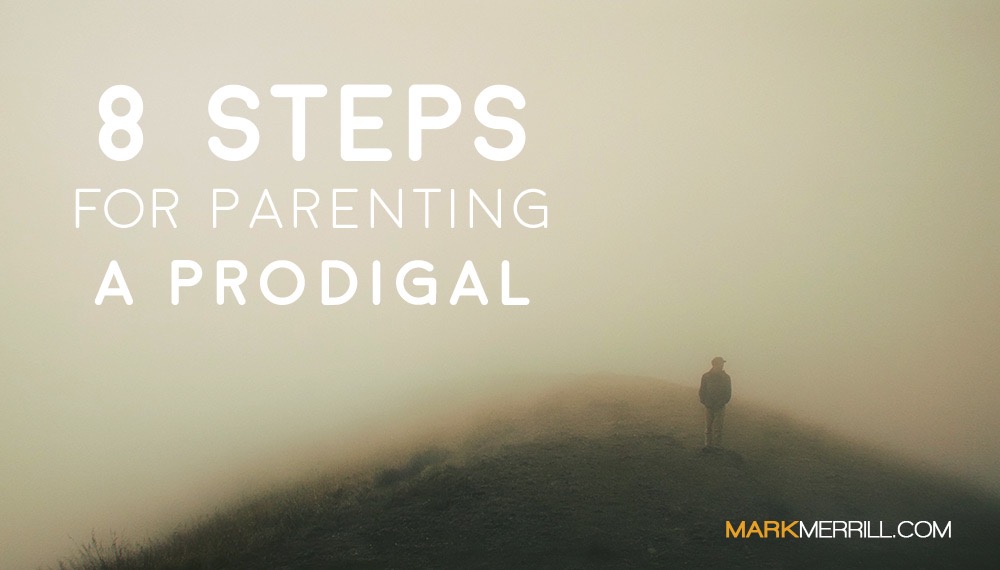All of us stumble a time or two on the journey to adulthood; after all, no one is perfect. One of the challenges of parenthood is gradually letting go of our children, giving them more freedom and responsibility as they grow. But what do you do when it’s not just a slip or a slight detour, but your older child goes completely off the rails?
There’s probably no greater heartache for a parent than when their dream for their child dies when someone they have poured their life and love into for so many years seems to reject everything they have ever wanted for and taught their child. My wife, Susan, and I have discussed this in our podcast, Loving Your Child Through Teenage Rebellion.
If you are facing this kind of difficult situation, take heart. Consider these eight lessons that are to be found in one of the most famous stories about rebellion ever told: The Prodigal Son.
You may recall how Jesus told of the young man who asked for his father’s inheritance, took off for a place far away where he squandered everything on wild living and finally came to his senses in a pig sty. The son returned home to ask to be put on his father’s payroll as a hired hand. Instead, to his great surprise, he was welcomed with a big hug and big party.
But beneath the happily-ever-after surface of the parable of the prodigal son are some steps to help you—and your child—through a time of rebellion.
1. Let them go.
Putting your foot down and locking them up won’t change their heart. The young man in the story realized the foolishness of his ways as he was allowed to follow his choices to their conclusion. The father didn’t try to shield his son from the law of cause and effect. That can be a scary thing, especially when there is risky behavior involved. Obviously, you may need to step in if they are younger or are seriously endangering themselves or others, but don’t be too quick to try to protect them from all that may follow as that could just prolong their waywardness.
2. Face your feelings.
Parents feel a great loss when children willfully turn their backs on all they have been modeled and taught. Take time to grieve the loss—and allow room for the anger that may surface too. Don’t bottle it all up inside. Here are 3 things to do when a dream dies.
3. Keep your head up.
Adding to the heartache of a child gone wild can be a sense of shame and failure. You think everyone else sees you as a failed parent. It can be healthy to reflect on the ways you may have contributed to your child’s decisions by your own mistakes or inadequacies so that you can change moving forward. You may even need to seek your child’s forgiveness. But your child is still ultimately responsible for his or her own choices. So don’t go into hiding; the father in the story continued about his business and waited out in public for his son to return.
4. Let them fail.
The prodigal only came to his senses when his life was in the dumpster and he was in great need. In that sense, the greatest gift the father gave his son was to let him become desperate. He didn’t keep bailing him out. Had he forced his son to stay home he may have simply nurtured a low-grade resistance for the rest of his life. Sometimes people need to be allowed to realize the poverty of their decisions. How to Create Healthy Boundaries for Rebellious Teens looks at some ways of establishing rules and consequences appropriately.
5. Remember the other kids.
It’s the squeaky wheel that gets the grease, and the troublesome child can draw most of the attention. In the parable, the older brother certainly resented his father, to a degree. Ensure your other children know they are loved and accepted for who they are. Reading Attitudes: Steps to Opening Your Child’s Spirit may be helpful.
6. Be expectant.
Waiting, wondering, and worrying about a child is hard. A friend whose son disappeared into drugs and alcohol abuse told me how he feared every phone call from an unknown number, wondering whether it might be the police calling to tell him his boy had been arrested—or worse. But remember that while your child may be beyond your reach, he or she is never beyond God’s. Hold onto hope, just as the father looked down the road for his returning son.
7. Don’t rescue them too soon.
They may need to stew in their own juice for a little while to really come to understand where they have gone wrong. There’s a difference between remorse and repentance. It’s one thing to feel bad about something in the moment; it’s another to demonstrate a serious desire to change over time. The son did that by walking all the way home from the far place he has gone to. He didn’t just say he was sorry and have his dad FedEx him an airline ticket. It’s important to know that your child really wants to change and isn’t just uncomfortable.
8. Offer grace.
They say the proof of the pudding is in the eating and the purity of your love for your child will never be more apparent than when they come home with their tail between their legs and find open arms and forgiveness rather than folded arms and a lecture. The prodigal son knew he’d messed up; he didn’t know until he got back the full extent of his father’s love.
They call all this tough love. Not just because it’s firm for the one to whom it is offered but because it is a hard balancing act to manage for the ones extending it. But being firm does not mean being harsh.
Were you once a prodigal also? If so, how did the experience affect your family relationships and what brought you home? What would you say to help or encourage parents facing similar situations now?
Is your child in a far-off place now? If so, how are you dealing with it? Share your experiences below.



